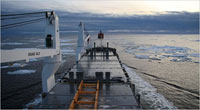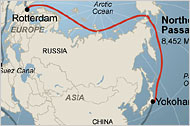 We have been following the progress of Beluga Shipping in their attempt to make a commercial transit of the “Northern Sea Route” which is also referred to as the “North East Passage.” See our “Beluga Group attempts the Northern Sea Route” and “Arctic Waters are Getting Busier“.
We have been following the progress of Beluga Shipping in their attempt to make a commercial transit of the “Northern Sea Route” which is also referred to as the “North East Passage.” See our “Beluga Group attempts the Northern Sea Route” and “Arctic Waters are Getting Busier“.
Captain D. Peter Boucher has a great update on Beluga’s progress on the Nautical Log Blog , in his post, North East Passage , as does yesterday’s New York Times, Arctic Shortcut Beckons Shippers as Ice Thaws.
Beluga’s ice class ships, MS Beluga Family, MS Beluga Fraternity, and MS Beluga Foresight have now successfully transited both the ice and the equally challenging Russian bureaucracy. The NY Times quotes Dr. Lawson W. Brigham who credits Beluga for taking on both the summertime Arctic waters, which still pose threats despite the recent sea-ice retreats, and Russian red tape, a maze of permits and regulations.
“This may be as much of a test run for the bureaucracy as for the ice,” said Dr. Brigham, an oceanographer who is a former Coast Guard icebreaker captain.
Captain Boucher on his Nautical Log Blog notes that the ship a are “transporting equipment for a power plant in individual lifts of 271 and 272 tonnes and 44 single lifts of over 100 tonnes each. The vessels will have Russian Ice Pilots advising the Masters and each vessel has a crew of 15 persons.”From the NY Times: Neils Stolberg, the president of the Beluga Group, said this week that the Arctic transit was not an experiment but the beginning of opening the route to outside traffic. He said his company already had new contracts for taking 1,000 tons of goods from Asia to Siberia next summer.
“We are all very proud and delighted to be the first Western shipping company which has successfully transited the legendary Northeast Passage and delivered the sensitive cargo safely through this extraordinarily demanding sea area,” Mr. Stolberg said in a statement.
The Russian government technically opened the Northeast Passage for international vessels after the breakup of the Soviet Union, but no commercial cargo carriers have until now ventured all the way across.

